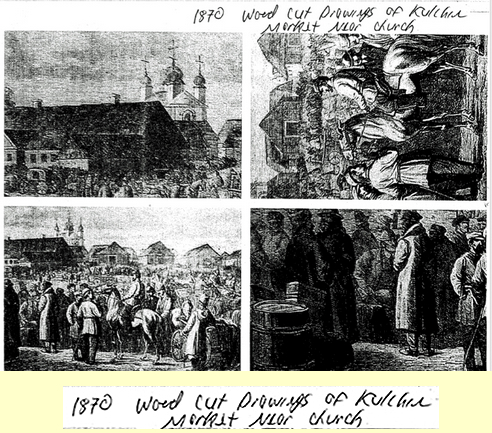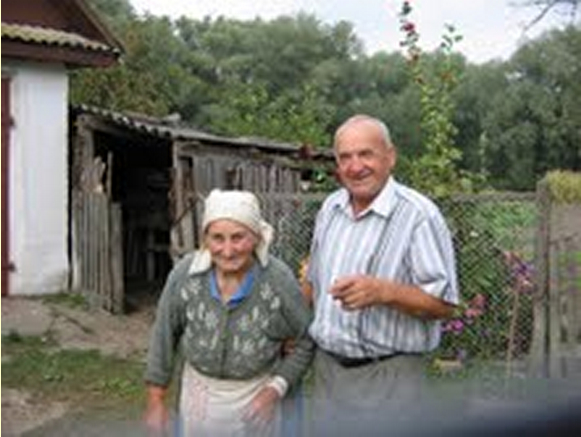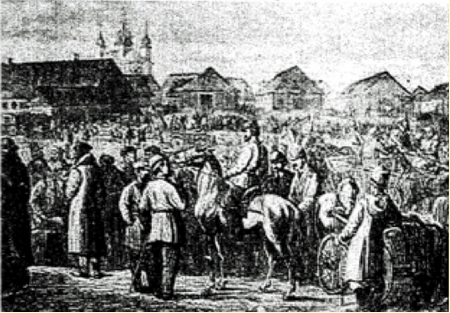
CONTENTS
CLICK ON ITEM TO DISPLAY
The Encyclopedia of Jewish Life
Impressions of Yefgenia Babich, by David Winer
Impressions of Kulchiny, by Herb Bixhorn
Yefgenia Babich’s Old Kulchiny, by David Winer
Kulchiny to America, by Herb Bixhorm
Births in 1854 in Krasilov and other nearby towns
Duma Voting lists - 1906, 1907, 1912
* * * * *
The Encyclopedia of Jewish Life (Excerpt)
Before and During the Holocaust
Editors Chief Schmuel Spector and Geoffrey Wigoder
In 1765, the Jews of Kulchiny numbered 177 and in 1897 there remained only 2,031 - 47% of the total population. By the 1920’s, a substantial number of its youth had moved to larger cities and many had emigrated. Therefore, the population dropped and in 1926, the Jews numbered only 1,266 - fewer than 33% of the town’s population.
The following if from a 1883 Polish Gazetteer, “Slownik Geograficzny, Krolestwa Poliego:
“In 1883, Kulczyn, in the District of Starokonstanty had 289 houses, 1,175 people and was sixty percent Jewish. It had a Catholic church, Russian Orthodox church, Jewish Synagogue and prayer house, brewery, leather makers, 37 stores, 5 markets. In 1752 Kulczyn was given from Lord Magnate Ostrogski.”
In 1926, Kulchiny had a Jewish Ethnic Soviet and a Jewish government school, both operated in Yiddish. A large number of the Jews were artisans, and many were organized in cooperatives. In the 1930’s, during the pre-war Soviet period, the village was the center of a Jewish rural soviet council (selsovet), and had an elementary school and active literary and drama circles.
As of 1931, 1,060 Jews lived in Kulchiny - the result of famine and the movement of Jews to other regions.

* * *
Impressions of Yefgenia Babich - An Elderly Resident of Kulchiny
Prepared following a visit by David J. Winer, July 2011

Yefgenia Babich and Dmytro Severenyuk
* * *
Impressions of a Visit to Kulchiny September 20, 2005 20, 2005
by Herb Bixhorn
Kulchiny is a village of 1,100 people. When we arrived in Kulchiny, we asked some children if there was anyone in the village who knew the history of the area. They led us to their school, where we were introduced to Dmytro Severenyuk, a history teacher. It was our unbelievable good luck to find, in this tiny village, someone who has written a book on the history of Kulchiny from medieval times up to World War I. Dmytro immediately asked if I was Jewish. When I answered “yes”, he broke into a smile, became very animated, and said “You know, this was a Jewish village”.
Dmytro showed me a copy of his book, which is written in Ukrainian. I randomly flipped through the pages, which are full of statistics. There on page 101, I saw the name of my great-grandfather, Yankel Leibovitch Bixgorin, listed as one of 34 grocery store owners in Kulchiny and the surrounding region.
Dmytro told us that Kulchiny had been an entirely Jewish village with Ukrainians living on the outskirts. The village was completely destroyed in World War II; there is no trace of it. The place where the village stood is now called the village center. It is a pitiful looking area with an abandoned building, another with a small shop, empty fields, and a school. The homes of present-day Kulchiny are on the edge of what had been the Jewish village.
Dmytro took us to his home. He gave me a copy of his book and signed it “To all Jews from Kulchiny who live in America, especially the Bixgorin family”. He then lead us to a small hill where the Jewish cemetery had been. There was nothing there, only a pasture. Then he took us to a wooded area where there had been a synagogue. Again, nothing there. Dmytro told us they found a tunnel that led from the synagogue to the lake. That apparently was a way for Jews to escape during Pogroms.

The Kulchiny market, in the heart of the Jewish district and ghetto of Kulchiny in olden days, was run by the Jews.
* * *
by Jerry Blafer
It is sad that I know so little of my father’s boyhood. When I was old enough to question him about Russia, he did not want to answer. World War II left deep scars, mutilated by the knowledge of what had happened to his family in Russia. He refused to try to find if anyone had survived the war. He feared what would have happened to them if the Soviets found out that they had American relatives.
In fact, my father spoke little with us, his children, about Kulchin. He did say that they had cold winters with very heavy snow falls. One story he related was that soldiers were quartered in Jewish homes during the Russian revolution and that a curfew was placed over the village. He and two friend went out during the curfew. They were seen and chased after by some soldiers. They ran into a home and jumped out of a rear window in an attempt to escape. Two of the boys made it to the river but the last boy was shot to death as he tried to leap out of the house.
We knew of few relatives in the US - an uncle and aunt and their three children, a brother, and a couple of cousins - all living in the New York - New Jersey metropolitan area. I know that my father corresponded with his family in Russia before WWII.

The original orthodox church, depicted in this drawing from from the Kulchiny book authored by Dmytro has been restored.
* * *
Yefgenia Babich’s Old Kulchiny
by Herb Bixhorn
Yefgenia’s parents were very close to Jewish people and her father did business with them. They were good people, good neighbors and very friendly. They were reliable and if we had a problem they always asked t the Jews first for help instead of the Ukrainians. The Jews spoke Ukrainian with no accent. She and her father used to understand Jewish language (Yiddish) but now forgot because it’s been over seventy years and haven’t used it since (she did say a few Yiddish words) When she was young, she and her younger sisters would sit down with Jewish girls and would play all kinds of instruments and sing. Other Ukrainian kids were jealous of them.
Many of the Jews were craftsman, shoemakers, tailors, specialists and merchant store owners. They had a milling factory, a brewery and stores. The Kulchiny market was well known and people from the surrounding area came around to shop. (Now there are no stores, market or factory)
More than half of Kulchiny was Jewish and there were two Synagogues, a social club, and Jewish library. There were three Jewish policemen and a Jewish policeman rented a room from my father.
Yevgenia said that aside from owning shops, Jews were skilled workers who produced clothing and shoes, and had pharmacies. On market days the village was full of activity with people coming from distant places to buy and sell.
Yevgenia’s father worked with Jews in shoe manufacture and could speak Yiddish. (My father had told me that he knew Ukrainians who could speak Yiddish as well as Jews.)
She mentioned the names of Jewish families she had been friends with, and said that some of her Ukrainian neighbors were envious and angry with her because of these friendships. Now Kulchiny has none of the activity of the past. It is made up entirely of farmers who work their fields outside the village.
* * *
By Herb Bixhorn, September 20, 2005
My grandfather left his family in Russia in 1911 to earn money in America to pay a debt he owed in Kulchiny. We have a letter in Russian from a village “elder” who apparently was serving as an intermediary to the creditor, thanking my grandfather for his payments. My grandfather intended to return to Russia, but World War I and then the revolution intervened. In the meantime, my grandmother died of cholera or typhus. (My grandmother’s maiden name was Shrago and she came from the nearby shtetl of Krasilov).
So, in 1921, my grandfather sent for his children to come live with him in East St. Louis Illinois. There and St. Louis Missouri is where the family was centered in America. The family’s passports were issued in Poland since that area of the Ukraine fell under Polish control for a brief period in 1921 during the chaos of the revolution and ensuing civil war. My father’s uncle and aunt decided not to come and remained in Kulchiny.
Following are some anecdotes I remember from my father:
My father’s family made moonshine vodka in a hidden area behind one of their bedrooms. There was a chimney or some other outlet for the smoke of the distilling process to leave the house. Police/tax collectors used to come snooping to find where the smoke was coming
from. The area was known for having a lot of illegal vodka-making. My father said his family would put someone in a bed next to the hidden door. They would tell the revenuers they could search if they wanted to, but they should not to disturb the person in the bedroom who had typhus. That would end the search.
During the spring thaw, the roads were a morass of mud and remaining snow with armies trying to get their horses and wagons through. One day my father watched as exhausted soldiers tried to pry wagons out of the mud. One soldier walked to the side of the road and sat down. An officer road up on a horse and told him to get back to work. The soldier refused and continued to sit there. The officer pulled out a pistol and pointed it at the soldier’s head. The soldier cried out “My G-d” as he was shot dead.
Russian soldiers were sometimes quartered in their home when an army passed through. The family would spend sleepless nights, but they were never harmed. When they heard the sound of gunfire, the family would do one of two things: either run to the forest and hide until things quieted down, or run to their attic where they would lie on pillows and quilts piled high on the flooring to stop any bullets. My father says that on these occasions they would hear people coming through their house and firing their guns.
In reading these anecdotes, I remember that my father was a child, at the time, and didn’t know whether the armies he saw were fighting World War I or were Whites or Reds fighting in the revolution/civil war. He told me that he thought that some of the “armies”, such as those they hid from in their attic, were simply gangs of bandits taking advantage of the chaos of the times. I thought some of these stories might be a bit contrived, but a Russian woman (not Jewish) who was from that area told me that these stories rang true, especially the ones about illegal vodka.
During the 1930’s, my father’s family in St. Louis corresponded with the aunt and uncle who remained in Kulchiny. The letters ended with the German invasion of the Soviet Union. In 1948, my father and his brothers received two letters from the aunt and uncle who had remained in the Soviet Union and now lived in Baku, Azerbaijan. They had somehow escaped the Germans in Kulchiny and made their way to Azerbaijan. The letter gave no details; it simply stated that what had happened to them during the war could not be described, and that our beautiful family no longer existed. She asked for the family in America to send letters and packages to help her in her extreme poverty. Our family sent these, but she never received them. Her last letter was poignant and bitter. She thought that we had abandoned her. Clearly, the Soviet government had not allowed our letters or packages to reach her, but for some reason had they let her letters reach us.
Copyright © 2012 David Winer